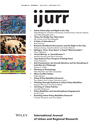This article examines how community representatives from a disadvantaged neighbourhood engage with neoliberal urban governance structures and assess the power afforded to them. It seeks to understand how community groups manage the challenges they face in times of neoliberal urbanism. This study follows calls to pay greater attention to the existence of imaginaries other than neoliberal ones, examining community actions and discourses surrounding the Historic Area Rejuvenation Project (HARP) area in Dublin, a project aimed at stimulating private property development and investment. The case highlights tensions between the pursuit of community-based and collaborative urban regeneration and the increased legitimacy of neoliberalism as a guiding principle of public policy. It confirms the existence of resistance movements and the importance of local and national contexts in explaining the outcomes of contestation. Despite participative structures established by the local authority, the views and interests of local community activists were ignored and excluded. Furthermore, in contrast to trends towards co-option within participative structures, the community actively resisted the imposition of neoliberal plans. Overall, while they had little success in influencing the plans or mindsets of the local authority, they did succeed in delaying the process until the project became unviable as a result of the economic crisis.

